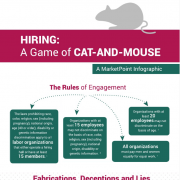Malaprops – When Words Say More than We Intend
We all misspeak. And sometimes, it’s comical. From Yogi Berra to George W. Bush, no one is immune to gaffes. But when the words we choose take on more meaning than we intended, it can be ironic, and maybe good for a few laughs, in which case, we call them malaprops.
This morning, for example, as I was reading Craigslist (often a brilliant source of malaprops), I came across a post from a young fellow who’s selling his 1997 Dell personal computer: “Selling My Dell Dementian Computer,” he announced. Of course, he meant “Dell Dimension” computer, but the words he typed were much closer to the truth than he may have cared to admit, given the context of his item description, which read, “It doesn’t have a lot of memory, but it’s still useful for some things.” I can only help someone will think as much of me, when I’m a “dementian.”
Not too long ago, I signed a company’s visitors’ log, just beneath another entry that was equally ironic. It seems an unemployed person had been sent by the unemployment office to apply for a job. Under the column “Purpose of Your Visit,” he had entered, “to fill out a placation.” I’m sure he was placating someone at the unemployment office, but that’s not the truth he thought he was relaying.
Another fellow, applying for a job with MarketPoint, once indicated that he could not provide his own transportation because he had lost his license for “wreckless driving.” It seemed, to me, that wreck-less driving should warrant a commendation, not a condemnation. But perhaps that’s just my perspective.
I remember, too, a certain courier who worked for one of my employers, in the late ‘80s. He always seemed to be one of those seedy types, hard to track down and usually up to no good. I asked him if I could add a stop on his afternoon run, to pick up a client, who was flying into BWI. It would require him staying in Baltimore at least two hours past his last drop-off, but I assured him we would reimburse dinner and pay his overtime. He responded, “No trouble, buddy. I’ll just malinger around Inner Harbor for a couple hours.” Malinger. How appropriate.
And a decade before, I had an encounter with a young woman, who was protesting the Catholic Church’s stance on abortion. Her specific position, as she expressed it to me, was a simple one: Forcing a woman to carry a child to term can, in some situations, endanger the life of the mother. And that’s almost the message her sign conveyed. It read, “The Catholic Church Engenders Women’s Lives.” Technically, of course, church policy engenders children, both male and female. (And neither gender is more prone to commit malaprops.)
The point remains. The words we choose sometimes tell a better story than we could ever tell, intentionally. It’s worth the effort to listen carefully to what we hear, and even more carefully to what we say.











